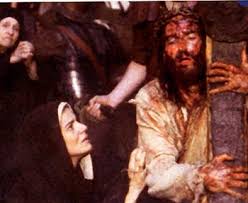New Creation through Faith and Love
(Isaiah 65:17-21; Ps 30; Jn 4:43-54)
********************************************
How strong is your faith? How deep is your love?
Important questions, these, because today’s liturgy invites us to be part of God’s new creation through faith in Jesus and love for one another
In the first reading, Isaiah prophesies that God will bring about a new creation, a new heaven and a new earth. That new creation will be joy for the Lord.
In the Gospel, we see that new creation coming about in the person and ministry of Jesus – through belief in him and his love for the poor and needy. The royal official is challenged to grow in faith, even as Jesus responds to his request to heal his son out of love and compassion. Because of the partial faith of the official in the Word of Jesus, the miracle happens, and now both the official and his household, we are told, believe in Jesus. The royal official’s weeping and concern turns to delight and joy as he discovers his son is healed.
In the movie by Mel Gibson, the Passion of the Christ, there is a poignant scene where Jesus meets his mother as he carries his cross, bloody and beaten. Mary reaches out to him with the words, “I am here” as she gazes with sorrow and compassion on her Son. Jesus responds with one simple yet profound sentence – “See, mother, I make all things new.”

It is a striking scene and statement. A man on the verge of collapse from the weight of the cross and the torture afflicted on him, claiming to be the author of a new creation. Yet we know that is what happened. Through his suffering, death and resurrection, and the gift of his Spirit to the Church at Pentecost, Jesus truly has made everything new. He is bringing about a new heaven and a new earth for those who believe in him and love others as he has loved us.
There is another surprising element of newness in the healing of the royal official’s son and that is a radical inclusivity in the ministry of Jesus. For a non-Jew of nobility to trust in an itinerant Jewish healer with no formal credentials is certainly a breakthrough into newness. This is also one of the few examples of a non-local healing of a non-Jew in Jesus’ ministry. As Richard Rohr points out, there is no mention whatsoever of any checklist of beliefs, no correct loyalty systems, no asking whether the royal official is in a regular marriage or has made a good confession of his sins. There is only mercy, compassion, inclusion, acceptance and above all healing. It seems rather irresponsible of Jesus, does it not? But does this not also resonate with Pope Francis washing the feet of prisoners, women, even non-Christians on Holy Thursday? Surely there is a message here especially for those who were upset by this action of the pope that is so similar to the indiscriminant healing of Jesus.
The Eucharist that we celebrate now is a foretaste of that heavenly banquet that is part of the newness that Jesus is bringing about.
May we participate in that new heaven and new earth, by our faith in Jesus, our openness to newness, and our love for one another.




The movie Passion of Christ is a great example to express about love , sorrow and compassion as the Virgin Mary sees her son being crucified on the cross . The Blessed Virgin expresses her sorrows and suffering while she sees her son make everything New . This is how you make a new world , creation and new life as you acknowledge loving yourself and loving other people . This is the road to healing as we learn what is mercy, compassion, suffering and acceptance when it comes to Holy Thursday and Good Friday. Amen . Blessings! Thanks for message and homily today. Bishop Lavoie
This week is talking about Joy and compassion since it is 4th Week of Lent. The newness of life and having Love.